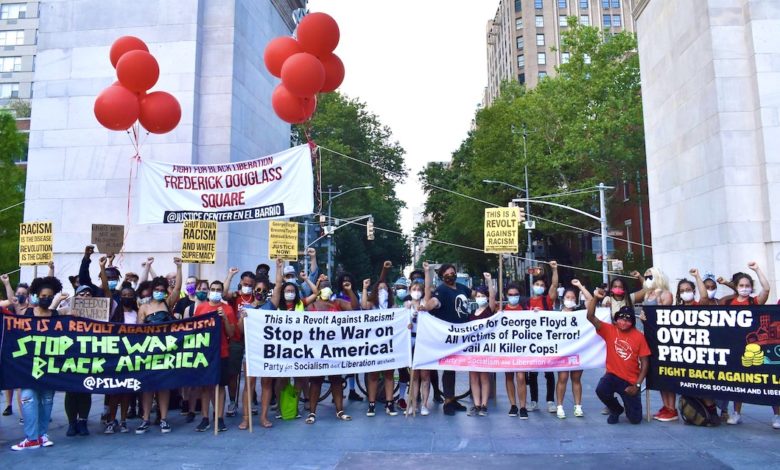
On the 4th of July, over 200 protesters marched through downtown Manhattan culminating in a speak-out reclaiming New York City’s Washington Square Park as Frederick Douglass Square. Speakers at the protest addressed police brutality in this country, wealth inequality, Black oppression, U.S. imperialism and the militarization of schools and communities.
The speakout and march was organized by the New York City branch of Party for Socialism and Liberation, co-sponsored by the community organizations Bushwick Youth Coalition from Brooklyn and the Point CDC in the Bronx, as well as the tenants’ rights group Holmes-Isaacs Coalition and the internationalist group Defend Democracy in Brazil. The progressive Brazilian channel TV4 did a follow-up interview with organizer Gabriela Silva.
It was impossible to miss the class dynamics on display. As the march passed by several high-end restaurants lining the streets of SoHo it was greeted by raised fists in solidarity from many of the restaurant workers, who were predominantly people of color.
Hypocrisy of July 4 exposed
While the 4th of July is represented as the triumph of American colonies over British repression, PSL organizer Sasha Murphy highlighted the hypocrisy of that narrative. She explained that for the U.S. working class, the holiday celebrates “one oppressor breaking from another so that they could become the dominant ruling class.” She added, “These urgent times call for this movement to move from righteous rebellion to victorious revolution.”
For many, the dissonance between the popular representation of the holiday and the everyday reality of living in this country has never been more visible than during this Black Lives Matter uprising against racism. BLM is now being called largest social movement in U.S. history with polls estimating 15-26 million participants nationwide.
Many protesters at the Douglass Square action wanted to go beyond demanding reform and defunding of the police to address the root causes of systemic racist oppression. Cody Israel from the Bushwick Youth Coalition called for continuity in the struggle for liberation and for “bringing the revolution to the front steps. Not today, not tomorrow, but everyday.”
One protester, Justin Rossman explained, “Our very existence can be criminalized, and we’ve been saying that, it’s not just in this time. … It’s not just the carceral system, it capitalism. The carceral system and capitalism work hand in hand.”
Saundrea Coleman, from the Holmes-Isaacs Towers Coalition, pointed out the racist roots of policing, as also seen in the creation of modern slavery in the prisons today. She called on the city to “reallocate [police] funds to repair the crumbling New York City Housing Authority’s infrastructure.” She added, “We are not here to rebuild America because we already did that, but we will reconstruct it even if we have to tear it down to rebuild it to a place where all men and women are truly equal.”
In the current struggle, many young working class people are willing to be much more assertive in efforts to reclaim power. For example, another protester, Soraya Mahieddine, noted that, while the Black Lives Matter movement is not new, “I think now it’s more righteous and it’s a lot less apologetic. I think it’s the kind of mind set that people should have moving forward. When educating people, a big thing that people need to realize is that confrontation can be good so that people can accept accountability. Without that we’re just not facing the truth.”
As statues and other emblems of U.S. racism are falling throughout the country, the protest reclaimed Washington Square Park by renaming the space Frederick Douglass Square. Lenny Rudd, a PSL organizer, closed out the action quoting Frederick Douglass: “What, to the American slave, is your 4th of July? I answer; a day that reveals to him, more than all other days in the year, the gross injustice and cruelty to which he is the constant victim. To him, your celebration is a sham.”





